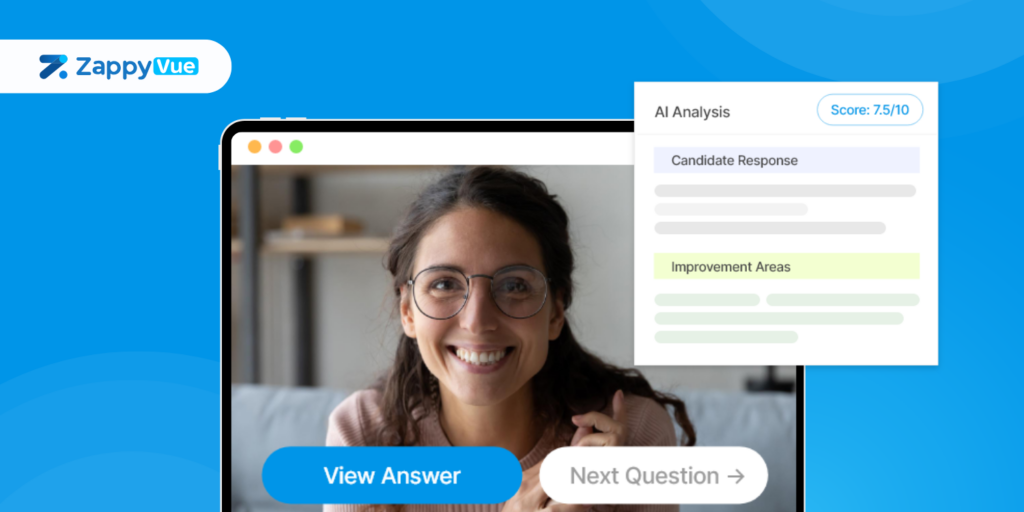
Butterflies in the stomach, sweaty palms before an interview – sound familiar? Your students are not alone. In fact, 93% of job candidates have experienced interview anxiety. This nervousness can rattle their performance and stand between them and their dream job.
As an EdTech platform or online learning + placement provider focused on student outcomes, it’s crucial to help learners overcome these interview jitters, sharpen interview skills and walk into job interviews with confidence.
One effective solution is to integrate mock video interviews into your placement preparation.
With hiring processes increasingly going virtual (about 82% of companies now use video interviews, and 93% plan to keep using them), helping students master the art of the video interview is more important than ever.
What is a mock video interview?
A mock video interview (also known as a video mock interview or virtual mock interview) is a practice interview conducted via video. It’s a simulation of a real job interview in a virtual setting. Just like a traditional mock interview, a video mock interview mimics the questions and conditions of an actual interview – but it takes place over a webcam using an online platform.
Whether live (with a mentor or teacher acting as the interviewer on a video call) or asynchronous (answering pre-recorded questions on camera), the goal is the same – to let the candidate practice their interview skills in a realistic, job-like scenario.
Key features of a mock video interview platform
Modern mock interview simulator tools (including many AI interview prep platforms) come loaded with features to create an effective practice experience.
Here are a few key features and capabilities that make video mock interviews so impactful.
Realistic simulation
The platform provides a real-world interview environment, often emulating a Zoom or Teams call. Students experience a virtual mock interview that mirrors the format of actual hiring interviews – from typical interview questions to the formal setting.
AI-powered personalized feedback
Many mock video interview tools leverage AI to act as a virtual interviewer and coach. For example, an AI mock interview system can ask questions and transcribe answers and evaluate keywords, domain knowledge, speaking pace, tone, filler words, facial expressions, and more.
Based on this, the tool delivers personalized feedback – highlighting strengths and pointing out areas for improvement.
Flexible, on-demand practice
Unlike a live mock interview with an instructor which must be scheduled, a video interview simulator is available 24/7. Students can practice anytime and anywhere, fitting interview prep around their busy schedules.
Performance analytics & recording
Good simulators provide performance analytics to track progress over time. They might show metrics like speaking speed, use of filler words, eye contact (if using webcam monitoring), or an overall performance score.
Diverse question bank
To prepare students for anything, mock interview tools usually include an extensive library of questions. This often covers common HR questions (“Tell me about yourself”), behavioral prompts (“Describe a challenge you overcame”), and technical or role-specific questions.
Some platforms, like ZappyVue, even allow customization of questions to fit different industries or job roles. Students get exposed to a wide range of scenarios, from entry-level queries to tough puzzles, ensuring thorough video interview prep.

Benefits of using video interview simulators to train students for job interviews
Implementing mock video interviews as part of your curriculum or placement support isn’t just good for students – it delivers significant benefits to your organization as well.
Let’s take a look at some of the key advantages for EdTech companies, online course providers, and universities that embrace these virtual interview prep tools.
Boosts student confidence and readiness
Practice makes perfect. By the time students face real interviews, they’ve already gone through the motions multiple times. This dramatically lowers their anxiety and boosts their self-confidence.
Studies show that practicing via simulated interviews reduces interview anxiety and helps candidates better cope with stress.
Builds familiarity with video interview platforms
Practicing on an actual video interview platform helps students get comfortable with the format and functionality – whether it’s navigating questions, handling time limits, or recording responses.
This hands-on exposure increases their confidence and reduces the chances of technical errors or confusion during real interviews, allowing them to focus on showcasing their skills instead.
Improves job placement rates and success stories
With the rise of automated video interviews being used in the pre-screening stage of an interview,y incorporating online mock video interview practice helps educational programs see a direct uptick in placement success.
Each student who secures a job becomes a success story for your brand, validating the effectiveness of your course and attracting future candidates.
Delivers automated feedback at scale
One-on-one career coaching for every student is resource-intensive. Mock video interview platforms solve this by delivering personalized feedback at scale.
AI algorithms evaluate each student’s performance and instantly generates an analysis of their interview performance and scores..
This ensures every student gets quality feedback without overburdening your staff.
Coaches and mentors can then step in to review recordings or address specific issues, rather than spending time on basic Q&A practice.
Provides data-driven insights for course improvement
The aggregate data from mock interviews is a goldmine for program managers. You can spot trends across all your students – perhaps noticing that many struggle with behavioral questions or have weak answers about their strengths/weaknesses.
Such insights allow you to refine your curriculum or add extra workshops on those topics. Analyzing interview performance can lead to more effective training methods that align with real job market needs.
So, mock interviews not only prepare students, but also inform educators where to focus their teaching for maximum impact.
Increases student engagement and retention
Let’s face it – practicing via an interactive interview simulation is far more engaging than just reading tips from a slide deck. Students often find these mock interviews challenging yet fun, almost like an interactive game where they want to improve their “score.”
This hands-on approach keeps learners engaged in the program. They’re more likely to complete the course when they see tangible, real-world skill building.
Plus, the confidence they gain can motivate them to stick with the program to reach that end goal of getting placed.
Differentiates your platform from the competition
In the crowded EdTech and online learning market, offering online mock interview practice can set you apart.
By highlighting that your platform includes state-of-the-art interview simulation online, you give prospective students a compelling reason to choose you over others.
It sends a message that you go beyond just teaching theory – you actually ensure students are job-ready, which is a powerful differentiator.
Strengthens employer partnerships and trust
Companies that hire from your programs will quickly notice the difference in candidate quality. When your graduates consistently come into interviews well-prepared, confident, and polished, employers gain trust in your institution’s training.
This can lead to stronger partnerships – employers may return to recruit more of your students, participate in your career fairs, or even collaborate on tailored training modules.
Over time, your placement cell can build a reputation among hiring companies that “students from your platform always shine in interviews,” reinforcing a virtuous cycle of trust and opportunity.
Opens new revenue streams and growth opportunities
Integrating mock video interviews can also make business sense. For instance, you might package virtual mock interview coaching as a premium offering or an add-on course that students (or even external job seekers) can pay for.
Career services modules with proven results can attract sponsorships or tie-ups with recruiters and staffing firms.
Improved placement rates and success stories enhance your brand value, which can justify higher course prices or help you expand into new markets.
Building job-ready confidence through practice
Mock video interviews offer students a priceless opportunity to make mistakes, learn, and grow before it really counts.
They get to refine everything from their storytelling to their webcam presence in a supportive setting. The outcome is not just better interview performance, but also greater self-assurance and professionalism as they transition into the working world.
Employers notice the difference – a candidate who has clearly prepared (and even seems unfazed by the video format) stands out as mature and ready.






